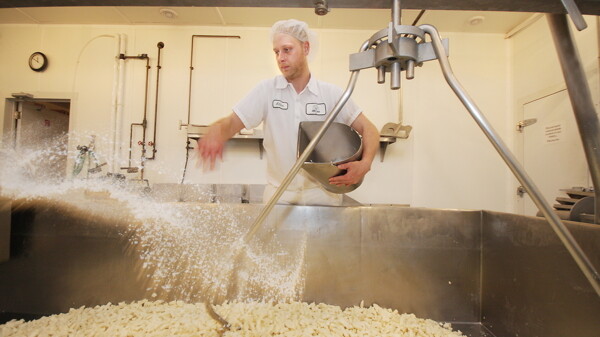How to Make a Cheesemaker
the controversy surrounding licensing for cheesemakers
Anna Semanko, photos by Andrea Paulseth

Despite what the commercials try to tell us, we all know that the cows are much happier in good old Wisconsin (the dairy state) than in the California heat.
While the cows are happy-go-lucky, us cheeseheads aren’t playing around. Over 90% of the milk produced in Wisconsin goes towards cheese production and many unique cheeses like baby swiss and colby were invented right here. Making cheese in Wisconsin is serious business. Wisconsin is the only state that requires a licensed cheesemaker to be on site during the manufacturing of each vat of cheese. With the amount of cheese being produced in Wisconsin on a daily basis, it is estimated that there are over 1,200 licensed cheesemakers in the state.
“Every cheesemaker does a lot of research, experimentation, reading, visiting other cheesemakers... No one wants to try to sell crappy cheese that people won’t buy or eat.” – Rama Hoffpauir, an aspiring cheesemaker
As most of us probably didn’t even think there was such a process, we may be wondering what this licensing entails. The license itself costs $75 dollars and has to be renewed every two years. Cheese guru Jeanne Carpenter, who writes for many cheese companies along with freelancing and running the “Wisconsin Cheese Originals” group (dedicated to introducing new artisan cheeses to the world), summed up the “newer” cheese licensing process, as it was changed to be more accommodating for smaller scale cheesemakers about 10 years ago. “The ‘new’ method requires a cheesemaker to attend five university-level short courses (2-5 days each), apprentice under a licensed cheesemaker for 240 hours, and then take a written test,” says Carpenter, “They cover the basics of cheesemaking: the art, science and sanitation aspects.”
The process of licensing typically takes about 12 to 18 months, but Carpenter feels it’s worth the wait if cheesemaking is your destiny, “Over the course of 18 months, you’re going to figure out whether being a cheesemaker is really what you want to do for a living. Those who truly do will make the financial and physical effort to move forward.” In the spirit of the dairy state, Carpenter awards one $2,500 Beginning Cheesemaker Scholarship every year to help out one lucky cheesemaking wannabe.
Aspiring cheesemaker Rama Hoffpauir, who has taken three out of the five required courses and is about 100 hours into her apprenticeship, depicts the burden that the licensing process can have on a local artisan or small scale cheesemaker. Hoffpauir feels that while having a licensed facility is very important, it is unfair for Wisconsin to be the only state to require licensing for artisan and small scale cheese makers. “The classes are mainly for the benefit of large cheese factories and the curriculum is geared towards those folks,” says Hoffpauir. “Apart from being an aspiring cheese maker, I’m also a full time mom to a toddler and the co-owner of a 260 vegetable CSA farm with my husband. Money, time, finding an apprenticeship, sitting on several hundred pounds of cheese that we can’t sell because I’m not a licensed cheese maker... It’s all been a struggle.”
Hoffpauir feels that licensing may deter some local cheesemakers and artisans who may not have the time or money. She thinks that by removing licensing, “there would be a greater number of artisan cheesemakers in Wisconsin and the people of Wisconsin would have much more amazing local cheeses to eat.” She suggests that aspiring cheesemakers may better spend their money visiting other cheesemakers to gain experience and knowledge. Hoffpauir points out that cheesemakers go into the business because they are passionate about it. “Every cheesemaker does a lot of research, experimentation, reading, visiting other cheesemakers... No one wants to try to sell crappy cheese that people won’t buy or eat.”
Carpenter agrees that the licensing requirements must cause a burden on the local artisans and smaller scale businesses, but she feels it is a necessary burden. “In Wisconsin, cheesemaking is our state’s identity. It is important that identity not be tarnished by poor products,” says Carpenter. She fears that if licensing was removed that there would be a rise of poor quality cheese in the area because of the detailed sanitation process it takes to make cheese, which is learned through the required courses.
Carpenter reiterates the necessity of licensing as a basic building block in the cheese industry, “Becoming licensed requires cheesemakers to learn the basic science and art behind cheesemaking. Many more continue their education in master classes once they become licensed,” she says.
Yes, you read that correctly. Not only can you get your license, but you can become a master. Leading the dairy race, Wisconsin is also the only state to have a master cheesemaker program. To qualify for the masters program, applicants must have held a cheesemakers license for at least 10 years, pass an interview and a plant inspection, and take an exam.
So whether you’re chowing down on factory-produced gouda or artisan-made swiss, you can rest assured that it was produced by a knowledgeable cheese crafter. Snack on that.

